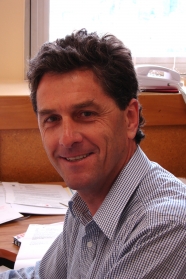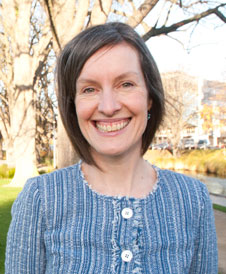Hospital's teaching role 'must be kept'
Sunday, 26 June 2016
Dunedin Hospital's role as a teaching hospital must be preserved in the $300 million hospital redevelopment, University of Otago Department of Medicine head Professor Rob Walker says. Professor Walker (60) is stepping down as department head at the end of this month, but continues in his other roles. It meant fewer meetings, and more time working as a nephrologist and for teaching and research, he said.

Professor Rob Walker
In the role for 17 years, he oversaw increased research output by fostering a supportive environment. Research was integral to Dunedin Hospital as a teaching hospital, because it attracted top clinicians. "My brief was to re-establish medicine as a vibrant academic department. We've increased our research profile dramatically. There is a number of dedicated researchers within the department, as well as the joint clinical staff.''
Eight years ago, medicine was re-established as its own department within the Dunedin School of Medicine after having been joined with the surgical department. While most people expect the hospital to be rebuilt on the same site, nothing is certain. If, for example, it shifted to Wakari, it would have "significant consequences'' for the medical school.
"It's very important that they maintain a university presence within the building. Any future planning must include a vision for the medical school to be actively involved within the clinical environment.''
While he views the rebuild as a "potential risk'', there seemed to be close talks between the university and the Southern District Health Board. In certain quarters, the medical school is seen as a financial burden on the health board, but Professor Walker firmly disagrees with that view. "They are in fact getting better value because they've got internationally recognised clinicians in Otago providing the best quality healthcare at the top of their fields.'' This was appreciated by the public.
"The community of Southland and Otago well recognise the expertise that is here and are very supportive, and we want them involved in our teaching. The community recognises why we're here, and we appreciate the community's support of our students, and participation in our clinical studies.''
The participation rate in clinical research in Otago and Southland was among the highest in the world. Professor Walker will hold on to the Mary Glendining Chair in Medicine, which is attached to the head of department position, after handing over to successor Associate Professor Michael Schultz on July 1.
"If [Michael] gets his promotion [to Professor], he'll get it,'' Professor Walker joked.
Otago health researchers honoured by HRC
Thursday, 9 June 2016
A world-renowned New Zealand longitudinal study researcher; a molecular biology pioneer and mentor; and two talented up-and-coming researchers from the University of Otago have received Health Research Council of New Zealand (HRC) awards for an outstanding contribution to health research excellence, leadership, and impact last evening. The awards were presented by HRC Board members Professor Jeroen Douwes and Ms Suzanne Snively, ONZM, at one of the University of Otago’s annual winter lectures in Wellington last evening.
Experienced health researchers Professors Richie Poulton and Warren Tate, and emerging researchers Associate Professor Suetonia Palmer and Dr Emma Wyeth were presented with their Celebrating Research Excellence Awards as part of the HRC’s 25-year anniversary celebrations.
Acting HRC Chief Executive Dr Tania Pocock says the HRC is immensely proud to recognise such high-calibre researchers in this way. “We wanted to celebrate the fantastic health researchers that we have here in New Zealand. Their work is making a real difference to the health and well-being of our people and contributing greatly to advances in global health research efforts.
The first established researcher award recipient, Professor Richie Poulton, has spearheaded one of the most detailed studies of human health and development ever undertaken Professor Warren Tate, who also received a HRC established researcher award, first became involved in HRC-funded research in 1977.

Associate Professor Suetonia Palmer
The first emerging researcher award recipient, Christchurch-based kidney specialist Associate Professor Suetonia Palmer, has gone from being a HRC clinical research training fellow to an internationally recognised and cited researcher in identifying the best and safest treatments for kidney disease and diabetes in less than a decade. Dr Palmer’s innovative work with chronic kidney disease patients saw her become the first New Zealander to win a L’Oréal UNESCO Australia and New Zealand for Women in Science Fellowship. She has since received a HRC emerging researcher first grant, and secured a Rutherford Discovery Fellowship for five years. Continuing her impressive career progression, last year she also received a HRC project grant where she is involved in a large bi-national clinical trial with the Australasian Kidney Trials Network.
The second emerging researcher award recipient, Dr Emma Wyeth, is an excellent example of a young researcher who has flourished as a result of opportunities offered by the HRC. A recipient of a HRC Māori Health PhD Scholarship, she went on to become a HRC Eru Pōmare Post-Doctoral Research Fellow, and in 2014 was awarded a HRC Emerging Researcher First Grant for her project to reduce the burden of disability for injured Māori. Dr Wyeth’s outstanding research capabilities are matched by her recognised leadership qualities. She’s director of the Ngāi Tahu Māori Health Research Unit at the University of Otago and just this year was appointed co-deputy director and a principal investigator of the Māori Health Centre of Research Excellence, Ngā Pae o te Māramatanga.
University Deputy Vice-Chancellor, Research and Enterprise, Professor Richard Blaikie says he is delighted that the HRC has honoured the Otago four in this way. “Each of these fine researchers is richly deserving of this recognition. They exemplify the University’s longstanding commitment to pursuing world-class research that aims to improve the health and well-being of New Zealanders,” Professor Blaikie says.
Medal recognises 'all these wonderful people'
Wednesday, 18 May 2016
Head of the University of Otago department of medicine and clinical nephrologist in the Southern District Health Board (SDHB) Professor Robert Walker was the star of the joint School of Medicine and SDHB excellence awards last night.

Professor Rob Walker receives the Dean's Research Medal for exceptional and ongoing work in the DSM from Professor Barry Taylor
Professor Walker was awarded a $50,000 research development investment for his work studying how ageing kidneys function in individuals who have conditions including diabetes.
He was also awarded the Dean's Research Medal for exceptional and ongoing work in the Dunedin School of Medicine.
Professor Walker said the medal was a recognition of the work of numerous people. "This medal goes to a large number of people that I work with.'' He credited clinicians, pharmacists, people involved with national and international trials, and people who worked in laboratories. "This medal is a recognition of all these wonderful people, not just me,'' he said.
A University of Otago statement about the awards praised Professor Walker's achievements. "His research has covered a broad range of topics relating to kidney function that has resulted in well over 200 academic papers and representation on a number of national and international societies engaged in research on kidney function.'' The medal was awarded by Dunedin School of Medicine dean Professor Barry Taylor. Professor Taylor said Professor Walker had a good combination of teaching and research experience.
Dunedin School of Medicine Associate Dean of Research Professor Stephen Robertson presented other school awards to acknowledge the work of research support staff and high-quality publications by local researchers.
Dunedin School of Medicine Dean's Research Medal: (for excellence in research): Professor Robert Walker (Department of Medicine).
Dunedin School of Medicine awards: (2016 research development investments): Professor Robert Walker (Department of Medicine) (with Tracey Putt, John Schollum, Dan Wright)
Dunedin School of Medicine departmental awards: Department of Medicine (research support award): Ms Anne Ryalls; Department of Pathology (emerging researcher award): Dr Tania Slatter
